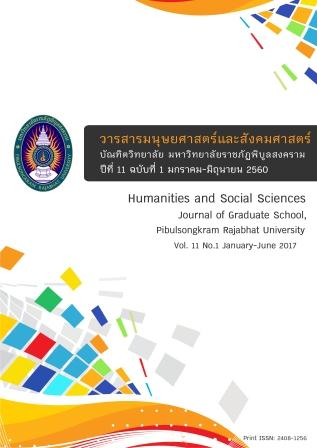การพัฒนาผลสัมฤทธิ์ทางการเรียนฟิสิกส์และความสามารถในการคิดวิเคราะห์ของนักเรียนชั้นมัธยมศึกษาปีที่ 4 เรื่องแรงและกฏการเคลื่อนที่ด้วยวิธีสอนแบบวัฏจักรการเรียนรู้ 7 ขั้น โดยเสริมความสามารถด้านการคิดวิเคราะห์ตามเทคนิคการจัดแผนผังมโนทัศน์
Keywords:
วัฏจักรการเรียนรู้ 7 ขั้น, แผนผังมโนทัศน์, ผลสัมฤทธิ์ทางการเรียน, การคิดวิเคราะห์, 7E-Learning Cycle, Concept Mapping, Learning Achievement, Analytical ThinkingAbstract
บทคัดย่อ
การวิจัยครั้งนี้มีวัตถุประสงค์ 1) เพื่อเปรียบเทียบผลสัมฤทธิ์ทางการเรียนก่อนและหลังเรียนเรื่อง แรงและกฎการเคลื่อนที่ของนักเรียนชั้นมัธยมศึกษาปีที่ 4 เมื่อเรียนด้วยวิธีสอนแบบวัฏจักรการเรียนรู้ 7 ขั้น โดยเสริมความสามารถด้านการคิดวิเคราะห์ตามเทคนิคการจัดแผนผังมโนทัศน์ 2) เพื่อเปรียบเทียบความสามารถในการคิดวิเคราะห์ก่อนเรียนและหลังเรียนเรื่อง แรงและกฎการเคลื่อนที่ของนักเรียนชั้นมัธยมศึกษาปีที่ 4 เมื่อเรียนด้วยวิธีสอนแบบวัฏจักรการเรียนรู้ 7 ขั้น โดยเสริมความสามารถด้านการคิดวิเคราะห์ตามเทคนิคการจัดแผนผังมโนทัศน์ กลุ่มตัวอย่างที่ใช้ในการวิจัย คือ นักเรียนชั้นมัธยมศึกษาปีที่ 4 โรงเรียนบางขันวิทยา จำนวน 40 คน ได้มาโดยการเลือกกลุ่มตัวอย่างแบบเจาะจง เครื่องมือที่ใช้ในการวิจัย คือ 1) แผนการจัดการเรียนรู้ด้วยวิธีสอนแบบวัฏจักรการเรียนรู้ 7 ขั้น โดยเสริมเทคนิคการจัดแผนผังมโนทัศน์ จำนวน 8 แผน 2) แบบทดสอบวัดผลสัมฤทธิ์ทางการเรียนฟิสิกส์ แบบปรนัยชนิดเลือกตอบ 4 ตัวเลือก จำนวน 30 ข้อ ซึ่งมีค่าอำนาจจำแนกเท่ากับ 0.22-0.75 ค่าความยากง่ายเท่ากับ 0.22-0.75 และค่าความเชื่อมั่นของข้อสอบเท่ากับ 0.87 3) แบบวัดความสามารถในการคิดวิเคราะห์ จำนวน 5 ข้อ มีค่าความเชื่อมั่นของข้อสอบเท่ากับ 0.86 สถิติที่ใช้ในการวิจัยคือ ค่าเฉลี่ย ส่วนเบี่ยงเบนมาตรฐาน และการทดสอบสมมติฐานใช้ T-Test แบบ Dependent ผลการวิจัย พบว่า
1. ผลสัมฤทธิ์ทางการเรียนฟิสิกส์ของนักเรียนชั้นมัธยมศึกษาปีที่ 4 หลังจากการจัดการเรียนรู้ด้วยวิธีสอนแบบวัฏจักรการเรียนรู้ 7 ขั้น โดยเสริมความสามารถด้านการคิดวิเคราะห์ตามเทคนิคการจัดแผนผังมโนทัศน์สูงกว่าก่อนเรียน อย่างมีนัยสำคัญที่ระดับ 0.05
2. ความสามารถในการคิดวิเคราะห์ของนักเรียนชั้นมัธยมศึกษาปีที่ 4 ภายหลังการเรียนรู้ด้วยแผนการจัดการเรียนรู้ด้วยวิธีสอนแบบวัฏจักรการเรียนรู้ 7 ขั้น โดยเสริมความสามารถด้านการคิดวิเคราะห์ตามเทคนิคการจัดแผนผังมโนทัศน์สูงกว่าก่อนเรียนอย่างมีนัยสำคัญทางสถิติที่ระดับ 0.05
Abstract
The purposes of this research are to 1) compare pretest and posttest of the physics learning achievement on force and Laws of Motion of grade10 students using 7E Learning Cycle and reinforcing Analytical Thinking Ability with Concept Mapping Technique and to
2) compare pretest and posttest of the Analytical Thinking Ability of the grade 10 using 7E Learning Cycle and reinforcing Analytical Thinking Ability with Concept Mapping Technique. The samples used in the study consisted of grade 10 students of Bangkhanwitthaya School; 40 people were selected by purposive sampling. The research instruments were 1) 8 lesson plan of 7E Learning Cycle and reinforcing Concept Mapping Technique, 2) 30 multiple-choice items of physics test which the discriminative (r) was from 0.22 to 0.50, the difficulty index (p) was from 0.22 to 0.75 and the reliability was 0.87, and 3) 5 items of analytical thinking tests with 0.86 reliability. The data analyses were mean, standard deviation, and hypothesis testing using t-test (Dependent Samples). The results of the research showed that
1) The learning achievement score of grade 10 students was higher than before using 7E Learning Cycle reinforcing analytical thinking with Concept mapping Technique in physics learning Force and Laws of Motion, which was statistically different at 0.05 levels.
2) The analytical thinking ability score of grade 10 students was higher than before using 7E Learning Cycle reinforce Analytical thinking with Concept mapping Technique in physics learning Force and Laws of Motion, which was statistically different at 0.05 levels.
Downloads
Published
How to Cite
Issue
Section
License
Any articles or comments appearing in the Journal of Humanities and Social Sciences, Rajabhat Phibulsongkram University, are the intellectual property of the authors, and do not necessarily reflect the views of the editorial board. Published articles are copyrighted by the Journal of Humanities and Social Sciences, Rajabhat Phibulsongkram University.









